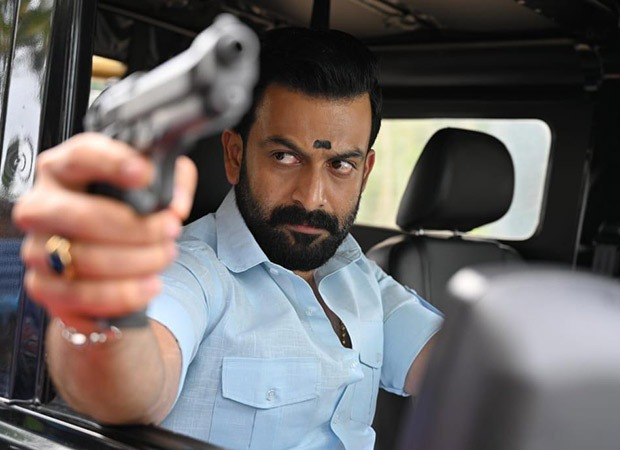
Kaapa review: With a tangible local flavour, Prithvraj film packs a punch

Ace filmmaker KG George often recounted how he depended on special editions of Malayalam literary magazines for his stories, which he would then give a cinematic makeover. Padmarajan was himself a top-notch literary figure, adept at adapting such stories into successful films. For sure, the practice preceded these maestros of the 1970s and the ’80s.
Of late, Ranjith apart, this art seems to be lost on the current crop of filmmakers. Many of the ‘new-wave’ filmmakers prefer to make films developed from single-line ‘threads,’ which is generally a collaborative effort. And, to create strong characters with unique identities, the new-age writers often go overboard, lending them quirky, caricaturish, and unrelatable qualities in the process.
Also read: South Indian films that bombed big time at the box-office in 2022
With the Prithviraj-starrer Kaapa hitting the bull’s eye by resorting to the oldest trick in the trade, scrounging for content in the Malayalam literary universe could yet see a revival. Kaapa has been adapted to the screen by writer GR Indugopan himself, and director Shaji Kailas has taken it to the next level. Kaapa was originally slated to be helmed by cinematographer-turned-director Venu, who withdrew after differences of opinion with producers (FEFKA writers’ union). In hindsight, Shaji Kailas fits the bill perfectly.
See Thiruvananthapuram in a new light
Kaapa — the title inspired by the Kerala Anti-Social Activities (Prevention) Act (or the Goonda Act) — is an adaptation of Indugopan’s novella Shankhumukhi, serialized in the Manorama weekly in 2019. It has Thiruvananthapuram’s dark underbelly as its backdrop, and you see Kerala’s capital in a totally new light in the film. Kaapa is about internecine gang wars and the settling of old scores, the vicious cycle that crimes lead people to, even when they want to lead normal lives. The film doesn’t lose any of the local flavour of the story, with the characters coming across as earthy and rooted.
Prithviraj aside, the other principal characters are played by Asif Ali, Aparna Balamurali, Anna Ben, and Dileesh Pothan. While the female characters have relatively less screen space, they leave you with a sucker punch as the end credits roll. Aparna Balamurali, in her new avatar, is a shoo-in for the maternal character of Prameela, originally meant to be essayed by Manju Warrier. Asif Ali is perhaps miscast, for he can no longer pull off such a naïve character meant to be played by a relative newcomer.
Also read: Baba review: Rajini’s cult film holds little appeal for a 2022 audience
Shaji Kailas made his comeback at the box office with the masala film Kaduva, which was let down by its poor writing. But with Kaapa, the veteran director hits the sweet spot, armed with a tight script. Shaji Kailas’ combination with Prithviraj seems to be working, and this pair could replicate the success the director had with Suresh Gopi in the past. The film is also tightly cut at 130 minutes and maintains the tempo generated in the opening sequences throughout. Of course, Kaapa might be a touch gory for the liking of a certain section of the audience, but it is only warranted here.
Tangible local flavour
Kaapa stays true to the novella in most parts, although the climax packs a punch compared to the original. Even for those who haven’t read the story, the film’s second half might seem a tad predictable, but it still engages the viewer and keeps him hooked. What’s possibly lacking is the emotional core that the novella brought to the fore, lost somewhere in the adaptation.
At no point do you really empathise with the character of Kotta Madhu, the protagonist essayed by Prithviraj. The actor has put in a commendable performance nevertheless, and his command of the Thiruvananthapuram dialect is impeccable. Jagadeesh, playing the henchman, steals the show when it comes to the rest of the cast. The flashbacks and sequencing of the narrative are excellent, and the brilliance of Shaji Kailas comes across.
Indugopan is likely to become a regular feature in Mollywood with Kaapa after the successful adaptation of Amminipilla Vettu Case into Oru Thekkan Thallu Case headlined by Biju Menon, and Vilayath Buddha in the pipeline. What makes his stories different is the tangible local flavour to them and the element of truth in it. Even Kaapa is inspired by a real-life event, as the writer wrote in his introduction to the novella.
Also read: RRR, KGF-2, Bheeshma Parvam & Ponniyan Selvan: South films rewrite box-office rules
The viewer who has not been exposed to the dark underbelly of a city like Thiruvananthapuram — with its IT parks and government offices — might find the storyline a tad incredible, but you eventually realise every city has such an underbelly if you stayed there long enough.
All in all, Kaapa is a great watch — except for the faint-hearted. The combination of Prithviraj at his prime and a vintage Shaji Kailas holds promise for the future.


